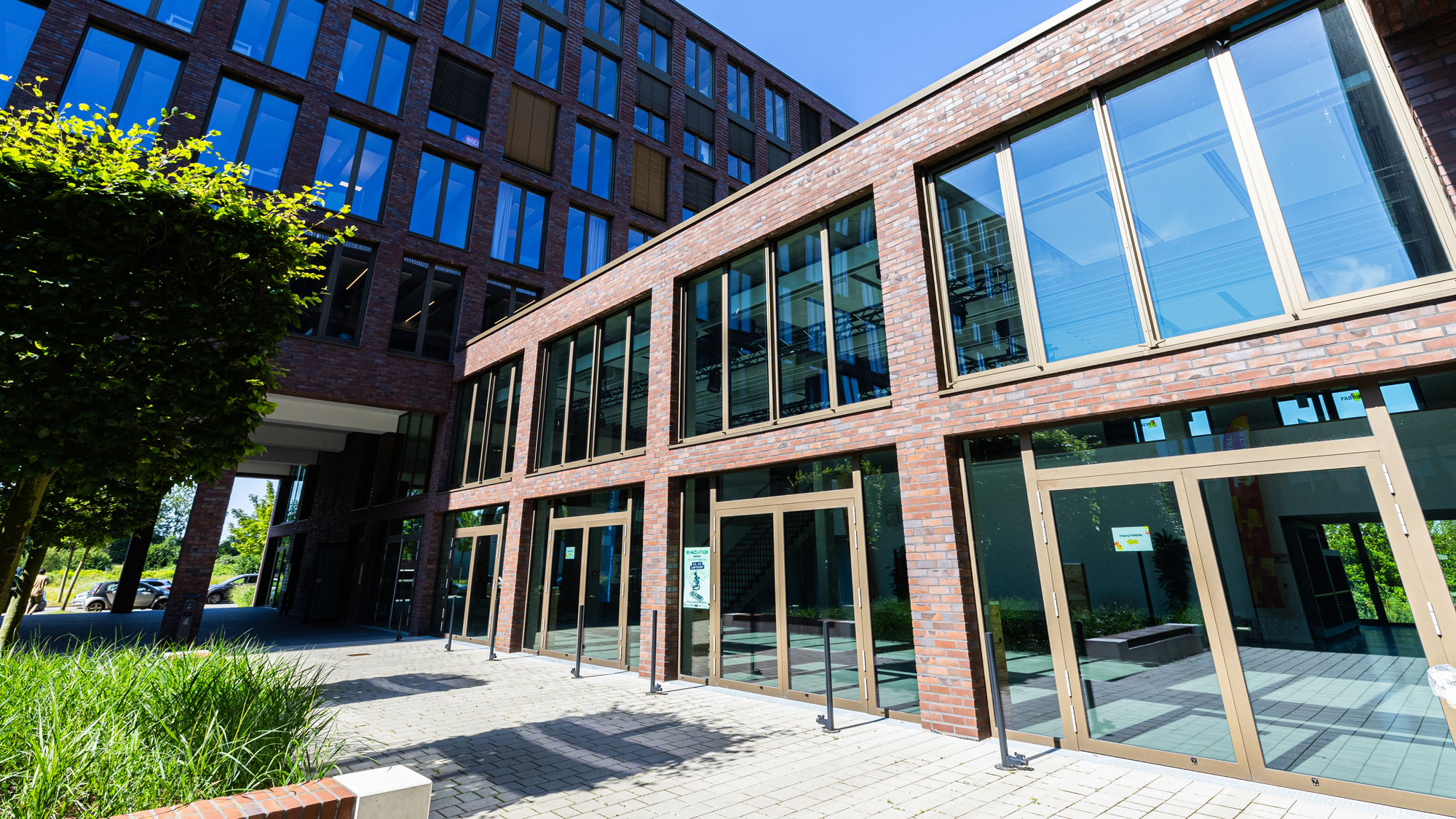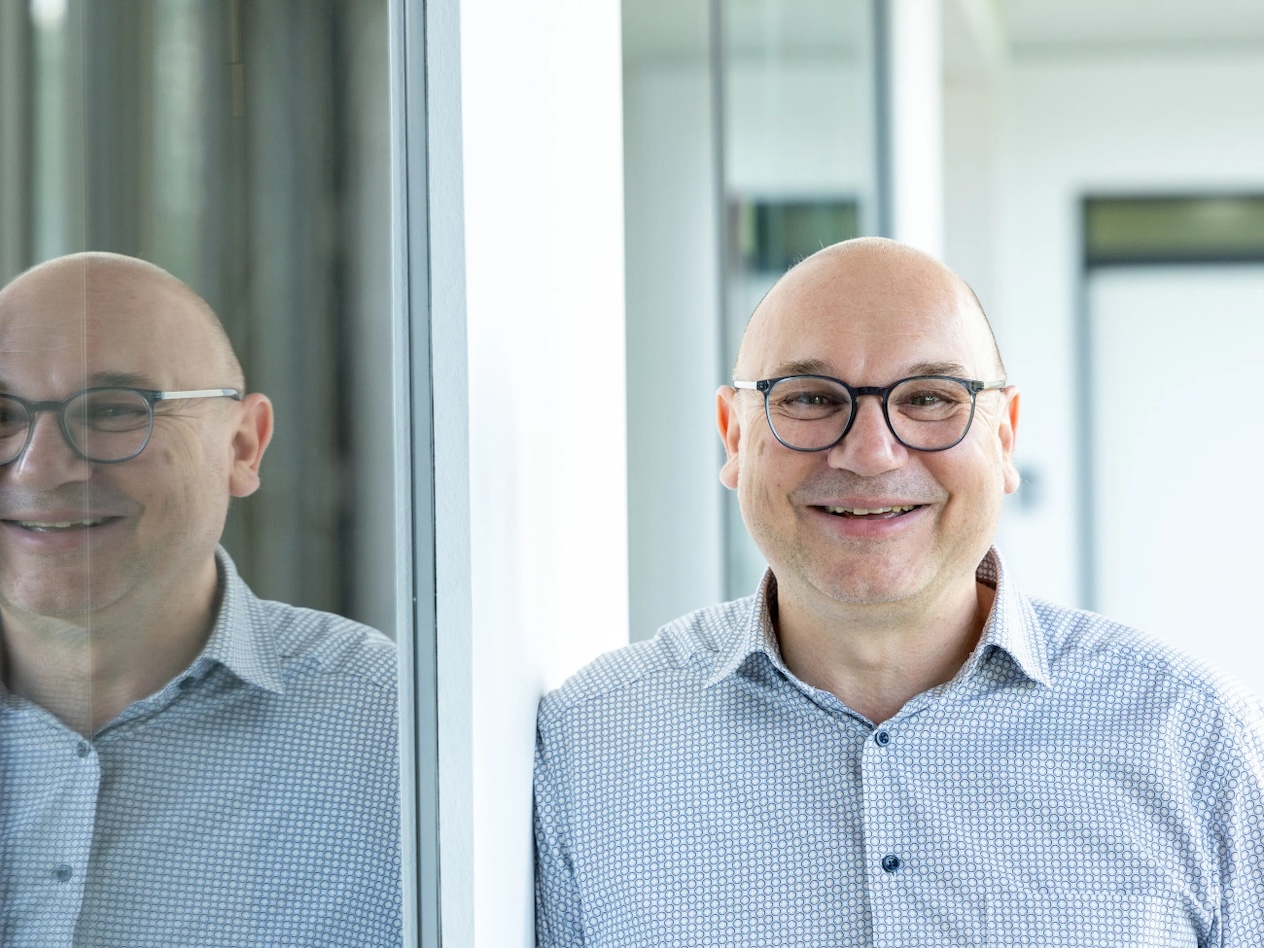
© DIGITAL HUB INDUSTRY Bremen e.V.
DIGITAL HUB INDUSTRY: Successful Technology Transfer Made in Bremen
The university is part of the collaborative project from Bremen. Hub manager Frank Bittner talks in an interview what it is all about
Artificial intelligence, digitalization, automation, Internet of Things, cloud computing, cybersecurity – the list of digital hot topics for commercial enterprises continues to grow. In academia, these technologies are being researched and developed. The challenge has always been to put the latest knowledge to industry use as quickly and accurately as possible. The DIGITAL HUB INDUSTRY in Bremen, in which the University of Bremen plays an important role, provides one example of how to make this transfer more efficient. We talked to hub manager Frank Bittner.
Mr. Bittner, the DIGITAL HUB INDUSTRY Bremen association has been located at the University of Bremen’s technology park for a little over two years now. What kind of organization is it?
The DIGITAL HUB INDUSTRY is the meeting place for companies looking for support and skilled workers in the field of digitalization. This is where companies meet the brightest minds from the world of academia – researchers, talents, and students who are looking for an employer or perhaps want to start their own business. And a place for academics/researchers who want to get in touch with the industry, with actual users.
What happens here in this ultra-modern NEOS building at the technology park that you moved into in 2022?
The hub organizes many activities at NEOS. Numerous events take place here, such as today’s hyBit hydrogen conference, which one day could put steel production at the ArcelorMittal plant in Bremen on a “green footing.” The hyBit working group is located here in the building, and the researchers are meeting today with people from industry. All issues relating to digitalization that come up in this large hydrogen consortium are discussed and developed here at the DIGITAL HUB INDUSTRY. With us, companies can get in contact with suitable partners from the scientific community.
We focus even more on small and medium-sized companies, which often do not have the capacity for digitalization, but urgently need to address this issue in order to remain competitive. Here, they receive targeted support and are introduced to the right contacts to help them position themselves for the future.
Who is located here?
Many different stakeholders from the university, as well as from academic and business communities are located here. One of them is BRIDGE, which is the central point of contact for business start-ups from Bremen universities. Another organization with offices here is EXIST, a program offering nationwide grants for start-ups and supports knowledge and technology transfer activities. The Digital Center for SMEs, an initiative of the Federal Ministry of Economic Affairs and Energy, has its office here, as well as the Artificial Intelligence Technology Transfer Center in Bremen/Bremerhaven. The Starthaus of the Bremen Aufbau-Bank, a start-up financier, is located here, as is ESA-BIC, the business incubator of the European Space Agency ESA. All of these support start-ups. But we also have existing start-ups here, or those who want to become start-ups…
…the list is long and we are in danger of running out of time for this interview…
And I could go on. We have companies that have emerged from the business community, such as Encoway and MicroFab, or successful university spin-offs, such as the 3D printing specialist Materialise, and OHB Digital Service, which handles digital issues for the Bremen-based satellite manufacturer. And finally, university research groups such as Professor Christoph Büskens’ Industrial Mathematics group and “his” spin-off Topas, Professor Armin Dekorsy’s Communications Engineering group with its Industrial Radio Lab, or Torben Stührmann’s Resilient Energy Systems group with its hydrogen projects. There are more stakeholders than I have mentioned here; overall, more than 500 people are involved. Importantly, they are no longer scattered all over Germany, but here in one great new building with short distances and many opportunities.

© DIGITAL HUB INDUSTRY Bremen e.V.
The DIGITAL HUB INDUSTRY is an association. Who is behind it?
Organizations that are very interested in an efficient, smooth exchange between business and academia on the subject of digitalization. The University of Bremen is, of course, a founding member – so are the Senator for Environment, Climate and Science, as well as the Senator for Economics, Ports and Transformation. In addition, WfB Wirtschaftsförderung Bremen, Encoway, the Institute for Information Management Bremen (ifib), and bremen digitalmedia, the association of media and information technology companies in Bremen State are part of it. Recently, TOPAS, the aforementioned spin-off from Industrial Mathematics, also joint us.
The 16,000 m² NEOS building was built by a private investor. All levels and all spaces were designed in such a way that people cross paths as often as possible and quickly find opportunities and resources for networking and collaboration. The resident companies, the university, and the DIGITAL HUB INDUSTRY are tenants. For the first five years, DHI’s operating costs will be paid for by the Bremen State.
The senates for economics and science have allocated significant amounts of funding to the DIGITAL HUB INDUSTRY. What is the objective of the Bremen government in this venture?
The hub is supposed to strengthen the location. It is also about meeting the demands that companies bring to research and development. Researchers from the university are supposed to identify what Bremen’s economy truly needs in the field of digitalization and then develop devices, processes, and how teaching must be designed in a targeted manner.
The digital hub industry makes the university an even more attractive study location, especially for engineering and information science students. It is highly attractive for young people, when students can study exciting, future-oriented topics and are also presented with attractive career perspectives after their have graduated.
DHI is still young. Are there already prominent examples of the university’s impact on the economy?
A great example is the start-up company aisencia. The company grew out of a university research project on AI-based image recognition. After the project ended, aisencia optimized the results for skin cancer detection and started the company with the help of BRIDGE, EXIST, and Starthaus here in the building.
Another great example is Marble Imaging, which was founded here only a year ago. It has also grown very quickly and moved up a floor. The company, with other European partner companies, is building the first European satellite network. This network will monitor the earth in very high resolution every day. It will also use the real-time data to make quick decisions in areas such as food security, energy, climate change, infrastructure, and global security. Importantly, in both of the above mentioned cases, knowledge generated in Bremen remains here and does not migrate to other locations or even to other countries.
“Our hub and the Bremen State are now playing in the Bundesliga.” Hub manager Frank Bittner on the recent inclusion in the German government’s de:hub initiative.
The Bremen DIGITAL HUB INDUSTRY has now been accepted into the de:hub initiative of the Federal Ministry for Economic Affairs and Energy and can call itself a de:hub Smart Manufacturing hub. What does that mean?
It means that we, as a hub and as the Federal State of Bremen, are now playing in the Bundesliga. We are proud of that. Being included in this initiative means we are closely networked with 24 other hubs, have a direct line to the Federal Ministry for Economic Affairs and Energy, and have completely different opportunities for international networking. For example, if it helps a start-up to develop quickly in the future, a representative of that start-up could fly to a conference in Portugal with the Federal Minister of Economics, Robert Habeck, in order to make specific contacts there. There are so many opportunities out there – but to take advantage of them, you have to be part of the select circle. We are now part of that circle.